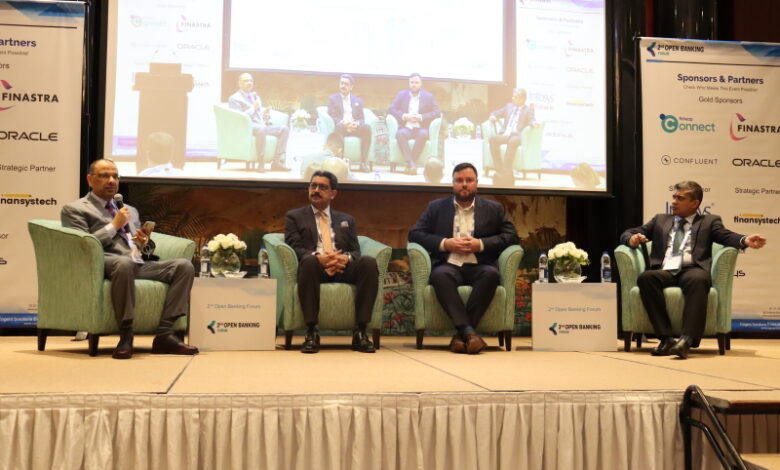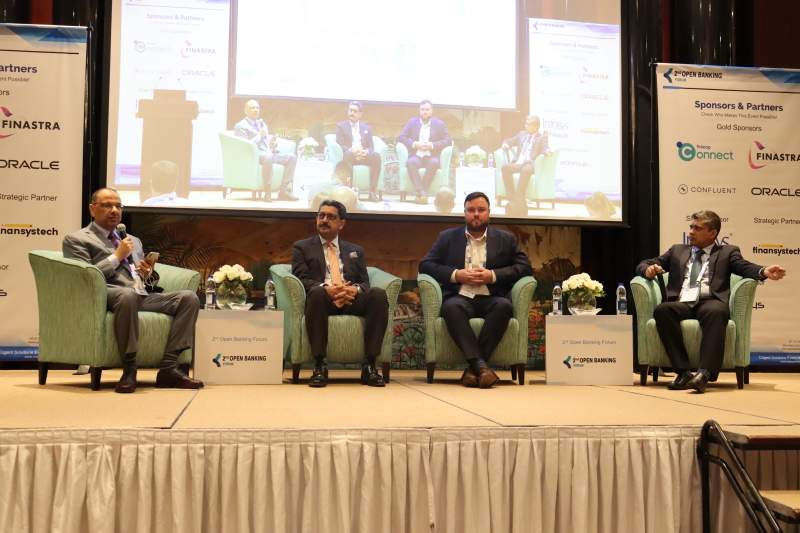
The 2nd Open Banking Forum honours the best financial institutions, the game changers, the innovators and those who are deploying the futuristic technologies to offer seamless banking experience
The face of the US$20.51 trillion global banking industry and the payment industry is changing rapidly due to the Open Banking revolution that is unfolding worldwide to become a $43.15 billion business worldwide by 2026.
From simple payment transactions, the industry is moving towards invisible pay that is easy, fast and invisible, as the industry re-discovers itself from a money-driven to a data-driven operation.

“Pandemic after-effects fueled industry transformation to a new era as payments become embedded, immersive and out of sight,” said World Payments Report 2021 by Capgemini published recently. “Embedded pay includes payments within products/offerings to enable convenient, personalised customer experience.”
Banking and financial services are soon going to be faceless, touchless and seamless experience for the customers where transactions and processes are going to be fully automated, nearly effortless and painless experience, delegates at the 2nd Open Banking Forum have learnt.
Organised by Cogent Solutions Event Management (CS Events), the 2nd Open Banking Forum, being held at the Dusit Thani Hotel, Dubai, examined the overall digital disruption in the banking sector in the MENA region as experts painted the picture of how the future of banking experience is going to be like.

Open Banking is a technology-powered practice that provides third-party financial service providers open access to consumer banking, transaction, and other financial data from banks and non-bank financial institutions through the use of Application Programming Interfaces (APIs), according to Investopedia. It is also known as ‘open bank data’.
API in essence, enables third-party developers to build applications and services around financial institutions. It facilitates greater financial transparency and helps financial institutions to innovate and create new and tailored services for its customers. With changing regulatory mandates, open banking has been gaining significant momentum across the globe.
Global non-cash transactions volume is set to grow at pre-pandemic level worldwide this year, sparked by the spending boom and rapid adoption of digital payments, crossing the 1 trillion volume landmark by 2022. Global non-cash transactions are poised to grow at a compound annual growth rate of 18.6 percent between 2020-2025 and reach 1.8 trillion by 2025, according to World Payments Report 2021.
According to data presented by Finaria.it, the global digital payments industry is expected to hit $6.6trn value in 2021, a 40 percent increase in two years. Most of these payments are done through the digital banking channels, enabled by innovative financial technology solutions such as APIs – which will be highlighted at the Open Banking Forum.
“The future of banking is going to be completely different from what it is now and it is going to be seamless, almost effortless, touchless and a very pleasant experience, compared to the current banking system where customers stand in queue for the services, resulting in a waste of valuable time,” Nizam Deen, Founder and Chief Executive Officer of CS Events, says.
“The COVID-19 pandemic has accelerated the pace of digitization in the banking sector – that now needs to create interfaces so that the customers can access banking services without physically visiting the bank branches or meeting banking professionals.
“The future of banking will be fully digital and driven by data where instead of man-to-man, transactions will be processed through machine-to-machine system. Banking will be more transparent and will save the valuable time of the customers.”
The 2nd Open Banking Forum features some of the best-known experts in the industry, including, Ellis Wang – Chief Technology Officer of Mashreq Bank; Viji Varghese – Head Global Payments and Clearing at Mashreq Bank; Justin Hadgkiss – Head of Cards and Payments at Zand; Mohamed Roushdy – Member- Arab Monetary Fund and Fintech Bazaar; Salim Awan – Managing Director, Magnati; Mamoun T Alhomssey – Chief Information Officer, Abu Dhabi Islamic Bank; Christian Kunz – Head of Strategy & Innovation. DIFC Authority; David Jegerson – EVP Head of Customer Experience and Platform Development, National Bank of Fujairah; Kunal Roy – Head Product and Value Proposition, Business Banking, RAKBANK; Brian Yeoh – Head of Data Governance and Strategy, ADGM and Hariprasad Chede – CISO, National Bank of Fujairah, among others.
They focus on key industry trends and issues including Open Banking: Understanding the API ecosystem by Mariam Saleem Khan, Head of Open Banking & Digital Change, JS Bank, while Ellis Wang – Chief Technology Officer, Mashreq Bank spoke on The Journey towards Open Banking: What Banks Need to Do to Enhance Value to Customers, in addition to a presentation on The Ongoing Disruption of Banking: The Shift to Data in Motion.
A panel discussion on Open Banking: Door to the future of payments was followed by another healthy discussion on Managing APIs in an expanding digital banking ecosystem. Open banking has been an accelerator for more profound digital transformation in the banking sector.
The global open banking market is projected to reach $43.15 billion by 2026, up from US$7.3 billion in 2018, according to a recent report from Allied Market Research, growing six-fold in eight years, as financial regulators, experts and officials debate the future of the banking industry.
The 2nd Open Banking Forum touches on the changes in the global financial services market that is expected to grow at 9.9 percent from US$20.49 trillion in 2020 to $22.51 trillion in 2021 and $28.52 trillion in 2025, according to Research and Markets, a global research advisory.
The banking sector represents more than a quarter of the size of the global economy.
The number of open banking users worldwide is expected to grow at an average annual rate of nearly 50 percent between 2020 and 2024, with the European market being the largest. Europe accounted for approximately 12.2 million open banking users in 2020. This figure is expected to reach 63.8 million by 2024. As of 2020, 24.7 million individuals worldwide used open banking services, a number that is forecast to reach 132.2 million by 2024.
The two-day 2nd Open Banking Forum hybrid conference is participated by more than 200 delegates both virtually and in-person including experts, regulators and financial professionals who discuss the fintech-led disruption in the banking and financial sectors as well as opportunities in the financial sector.
Open Banking Awards
The 2nd Open Banking Forum honouredeight banks, financial institutions and technology innovators at an industry awards ceremony that highlighted their futuristic approach.
Mashreq Bank won the best award in the Innovation in Digital Banking category for Mashreq Neo while Zand – the newest digital bank licensed by the UAE Central Bank this year, won the Digital Disruptor of the Year award.
Magnati Payments, UAE won the Payments Excellence Award while Abu Dhabi Islamic Bank won the best award in the Innovation in Islamic Banking category.
Brazilian fin-tech leader Finansystech won the best Open Banking Solution Provider award. Finansystech is a modular plug and play open-source technology that allows financial services to provide secure open finance solutions. We are here to solve a problem.
It is an open finance platform as a service. Finansystech provides Brazil’s Central Bank regulatory integration models and technical standards. Also, it complies with UK, AUD and future UAE standards. Finansystech is the first company in the world certified by OpenID, an international standard for identity security in payment initiations. Today, it is the only Latin American Fintech certified in FAPI and CIBA.





